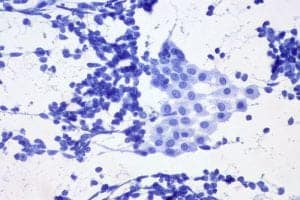Vitamin C is known to boost the immune system and help fight off the common cold, but now a study says it’s even more potent than previously thought. High amounts of it can also kill cancer cells.
But don’t reach for your vitamin bottle just yet. This type of treatment isn’t possible in the oral pill variety or chewable form.

For vitamin C, also known as ascorbate, to help treat cancer it must be administered intravenously to create super-high concentrations of it in the bloodstream. By bypassing the gut metabolism and excretion pathways, vitamin C creates blood levels that are 100-500 times higher than the levels obtained by taking it orally.
When vitamin C is found at extremely high — at the millimolar range — levels in the blood, it selectively kills cancer cells but not normal cells in test tubes or in mice.
Trials are currently being done by doctors at University of Iowa Hospitals and Clinics to see if they can get positive treatment results for pancreatic cancer and lung cancer patients given high-dose intravenous vitamin C along with chemotherapy or radiation. So far, phase one of these trials has indicated that this regimen combination is tolerated well by patients and that therapy has helped them. The larger trials will reveal if this style of treatment will help with cancer patient survival rates.
How Vitamin C Kills Cancer
Vitamin C breaks down easily and generates hydrogen peroxide, which is a reactive oxygen species known to damage tissue and DNA. The study proved that tumor cells were less capable of removing the damaging hydrogen peroxide than normal cells.

“In this paper we demonstrate that cancer cells are much less efficient in removing hydrogen peroxide than normal cells. Thus, cancer cells are much more prone to damage and death from a high amount of hydrogen peroxide,” says Garry Buettner, a professor of Radiation Oncology and a member of Holden Comprehensive Cancer Center at the University of Iowa. “This explains how the very, very high levels of vitamin C used in our clinical trials do not affect normal tissue, but can be damaging to tumor tissue.”
Why Normal Cells Stay Safe
Hydrogen peroxide levels stay very low in normal cells because normal cells have several ways to remove them. And the enzyme catalase is the main avenue for disposing the hydrogen peroxide created by decomposing vitamin C. So, cells with lower amounts of catalase were more prone to be damaged and die when they came in contact with high amounts of Vitamin C, according to researchers.
“This explains how the very, very high levels of vitamin C used in our clinical trials do not affect normal tissue, but can be damaging to tumor tissue,” adds Buettner.
Related: Americans Taking More Probiotics, Fewer Multivitamins
The next step for those involved in the study would be to identify which cancers would be most affected by high dosages of vitamin C. This would also involve measuring the levels of the enzyme catalase in various malignant tumors. These findings could lead to better long-term cancer treatments and therapies.
“Our results suggest that cancers with low levels of catalase are likely to be the most responsive to high-dose vitamin C therapy,” says Buettner, “whereas cancers with relatively high levels of catalase may be the least responsive.”
Ronke Idowu Reeves is a writer and journalist who hails from Brooklyn, NY. Her news and entertainment stories have appeared on WABC-TV-New York, Fox News Channel, VH1, BET.com plus in Sundance Film Festival’s Sundance Daily Insider and People Magazine.


![How To: ‘Fix’ Crepey Skin [Watch]](https://cdn.vitalupdates.com/wp-content/uploads/2017/05/bhmdad.png)












